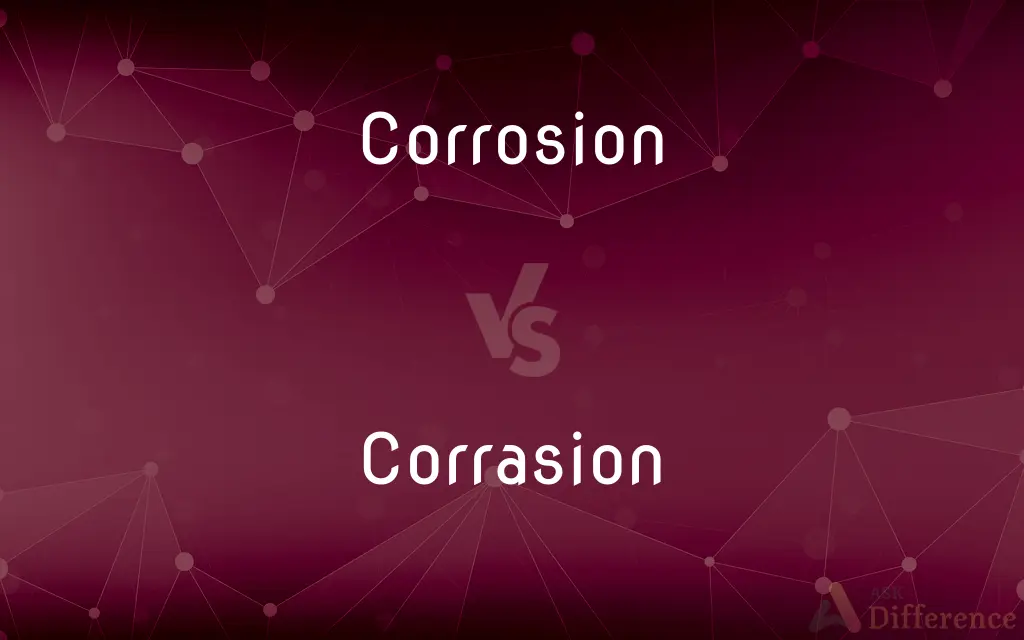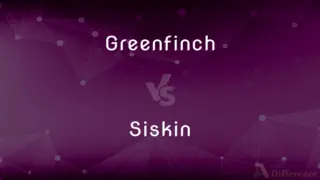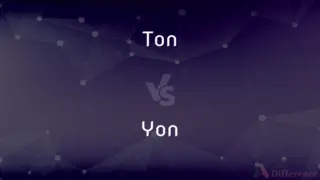Corrosion vs. Corrasion — What's the Difference?
By Fiza Rafique & Maham Liaqat — Updated on April 7, 2024
Corrosion involves chemical reactions that degrade materials, mostly metals, whereas corrasion refers to the mechanical erosion of surfaces by abrasive particles.

Difference Between Corrosion and Corrasion
Table of Contents
ADVERTISEMENT
Key Differences
Corrosion is a chemical process that leads to the deterioration of materials, especially metals, as a result of their reaction with environmental elements like oxygen or sulfur. This process is often observed as rusting in iron and steel when exposed to moisture and oxygen. On the other hand, corrasion, also known as abrasion, is a physical process that occurs when materials are worn away by the friction and impact of solid particles against a surface. This is commonly seen in natural environments where water or wind carries sand and other particles that grind against rock and soil surfaces.
While corrosion fundamentally involves a chemical reaction that changes the composition and often weakens the structure of the affected material, corrasion does not alter the chemical composition of the material. Instead, it physically removes material from the surface, potentially changing its shape or appearance. For example, corrosion can turn iron into rust (iron oxide), while corrasion can smooth or etch stone surfaces without changing the stone's chemical makeup.
The rate and extent of corrosion depend on factors such as the material's environment, the presence of corrosive agents, and the material's own chemical properties. In contrast, the rate of corrasion is influenced by the hardness, size, and velocity of the abrasive particles, as well as the hardness and resilience of the surface material. Therefore, while metals are particularly susceptible to corrosion, virtually any material can undergo corrasion under the right conditions.
Preventing or mitigating corrosion often involves controlling the environment around the material, using protective coatings, or selecting corrosion-resistant materials. Corrasion prevention, however, typically focuses on reducing the exposure of surfaces to abrasive forces, for instance, by using barriers or altering the flow of erosive mediums.
Understanding the differences between corrosion and corrasion is crucial in fields ranging from materials science to geology. While engineers must design against corrosion to ensure the longevity of metal structures and components, geologists and environmental scientists study corrasion to understand landscape evolution and sediment transport.
ADVERTISEMENT
Comparison Chart
Nature
Chemical reaction
Physical erosion
Causes
Reaction with environmental elements (e.g., oxygen)
Abrasion by particles (e.g., sand)
Affected Materials
Primarily metals
Any material exposed to abrasive forces
Outcome
Material deterioration, composition change
Physical wear, no composition change
Prevention
Protective coatings, corrosion-resistant materials
Barriers, altering erosive medium flow
Compare with Definitions
Corrosion
The transformation of materials into their oxides, hydroxides, or sulfides due to environmental effects.
Aluminum corrosion forms a protective oxide layer that prevents further degradation.
Corrasion
A key factor in the geological process of sediment transportation and deposition.
Riverbanks are shaped by corrasion from sediment-laden waters.
Corrosion
Degradation of materials' integrity through chemical reactions.
Corrosion of the pipeline was accelerated by acidic soil conditions.
Corrasion
The erosion or wearing away of bedrock or soil by moving particles.
The canyon walls were smoothed over millennia by corrasion from wind-blown sand.
Corrosion
Often associated with rusting in common parlance, particularly with iron and steel.
Rust is the most visible form of iron corrosion.
Corrasion
Does not change the chemical composition but alters the physical form of materials.
The sculpture's details were obscured by corrasion from particulate matter in the air.
Corrosion
A process that can weaken structures and cause failures over time.
The corrosion of the metal fasteners compromised the safety of the structure.
Corrasion
A physical process that shapes natural landscapes through the abrasive action of particles.
Corrasion by glacial movement left striations on the rocks.
Corrosion
The chemical process causing metal to deteriorate due to environmental interactions.
The bridge's steel structure showed signs of corrosion after years of exposure to salty sea air.
Corrasion
Can affect any material exposed to abrasive forces, not just natural geological formations.
The building's exterior showed signs of corrasion from years of exposure to blowing sand and dust.
Corrosion
Corrosion is a natural process that converts a refined metal into a more chemically stable form such as oxide, hydroxide, carbonate or sulfide. It is the gradual destruction of materials (usually a metal) by chemical and/or electrochemical reaction with their environment.
Corrasion
Corrasion is a geomorphological term for the process of mechanical erosion of the earth's surface caused when materials are transported across it by running water, waves, glaciers, wind or gravitational movement downslope. An example is the wearing away of rock on a river or seabed by the impact or grinding action of particles moving with the water.
Corrosion
The act or process of corroding.
Corrasion
To erode or be eroded by abrasion.
Corrosion
The condition produced by corroding.
Corrasion
(obsolete) The diminution of wealth, etc., such as through unanticipated expenditure.
Corrosion
A substance, such as rust, formed by corroding.
Corrasion
The wearing away of surface material.
Corrosion
The act of corroding or the condition so produced.
Corrasion
(geology) Corrading (erosion by abrasion) caused by such as: wind-blown or water-borne sand, stream-borne or glacier-borne stones, or collisions between stones under the influence of seaside breakers.
Corrosion
A substance (such as rust) so formed.
Corrasion
The erosion of the bed of a stream by running water, principally by attrition of the detritus carried along by the stream, but also by the solvent action of the water.
Corrosion
(chemistry) Erosion by chemical action, especially oxidation.
Corrasion
Erosion by friction
Corrosion
(by extension) The gradual destruction or undermining of something.
Corrosion
The action or effect of corrosive agents, or the process of corrosive change; as, the rusting of iron is a variety of corrosion.
Corrosion is a particular species of dissolution of bodies, either by an acid or a saline menstruum.
Corrosion
A state of deterioration in metals caused by oxidation or chemical action
Corrosion
Erosion by chemical action
Common Curiosities
What causes corrasion?
Corrasion is caused by the mechanical erosion of a material's surface by hard particles such as sand or silt.
What is corrosion?
Corrosion is the chemical degradation of materials, especially metals, due to environmental reactions.
What causes corrosion?
Corrosion is caused by the material's reaction with environmental elements such as oxygen, water, and acids.
What is corrasion?
Corrasion refers to the physical erosion or wearing away of materials by the abrasive action of particles.
How does corrosion differ from corrasion?
Corrosion involves chemical reactions that change the material's composition, while corrasion is a physical process that wears away material without altering its composition.
How can corrasion be mitigated?
Corrasion can be mitigated by reducing the exposure of surfaces to abrasive forces, using protective barriers, or altering the flow of erosive mediums.
Can corrosion and corrasion occur simultaneously?
Yes, in environments where materials are exposed to both chemical agents and abrasive forces, corrosion and corrasion can occur simultaneously.
Can corrasion affect non-metallic materials?
Yes, corrasion can affect any material exposed to abrasive forces, including rocks, soils, plastics, and even biological tissues.
Are all materials susceptible to corrosion?
While all materials can degrade, corrosion specifically refers to the chemical degradation of metals. Other materials may degrade through different processes.
How can corrosion be prevented?
Corrosion can be prevented through the use of protective coatings, corrosion-resistant materials, and controlling the environmental conditions.
What role does water play in corrosion and corrasion?
In corrosion, water can act as an electrolyte that facilitates electrochemical reactions. In corrasion, water can carry abrasive particles that wear away at materials.
Why is understanding corrosion and corrasion important in engineering?
Understanding these processes is vital for designing durable structures and machinery that can withstand environmental degradation over time.
Is rust an example of corrosion or corrasion?
Rust is an example of corrosion, specifically the result of iron reacting with oxygen and water.
How do environmental conditions affect corrosion and corrasion rates?
Environmental conditions, including moisture, temperature, and the presence of abrasive particles, can significantly affect the rates of both corrosion and corrasion.
Can the effects of corrosion and corrasion be reversed?
While the effects of corrasion can sometimes be mechanically repaired, the chemical changes from corrosion are often irreversible and require replacement or extensive refurbishment of the affected material.
Share Your Discovery

Previous Comparison
Greenfinch vs. Siskin
Next Comparison
Ton vs. YonAuthor Spotlight
Written by
Fiza RafiqueFiza Rafique is a skilled content writer at AskDifference.com, where she meticulously refines and enhances written pieces. Drawing from her vast editorial expertise, Fiza ensures clarity, accuracy, and precision in every article. Passionate about language, she continually seeks to elevate the quality of content for readers worldwide.
Co-written by
Maham Liaqat















































